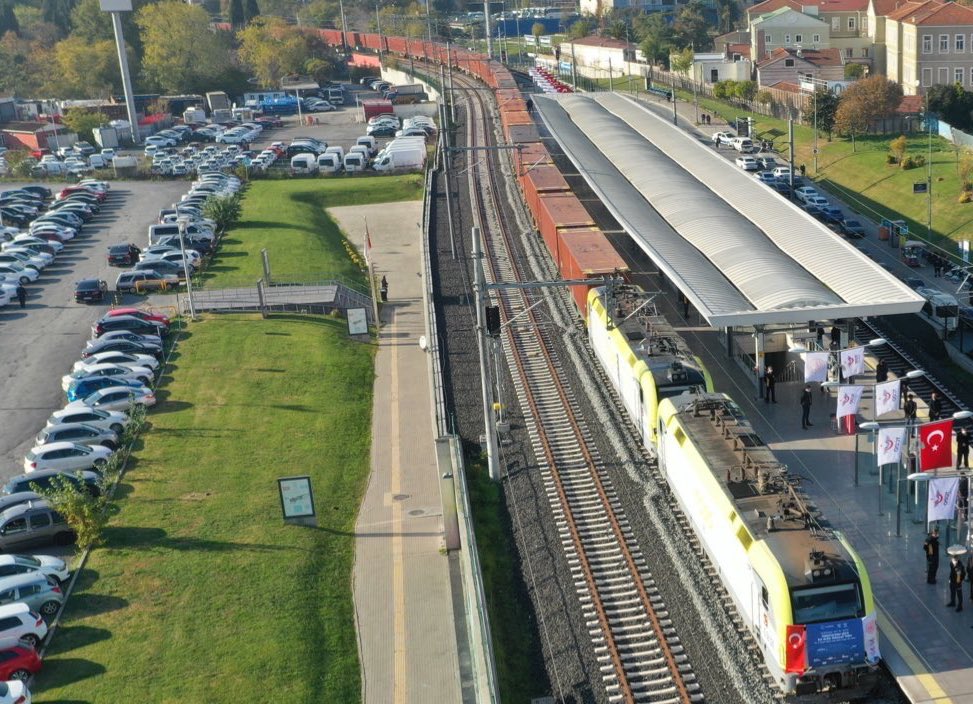Amidst international concerns over Brexit and new strains of coronavirus, a major milestone has failed to make global headlines in the way that it should.
On 19 December, a freight train from Turkey to China embarked on its maiden voyage that took a fortnight to complete, travelling along 5,400 miles (8,670 kilometres) of continuous rail track that stretches across two continents and five territories.
The train, carrying 1,383 Turkish-made refrigerators worth $1.59 million (about 10.4 million yuan) on 42 carriages, set off from Istanbul on Dec. 4, passing through eastern Turkey, into Georgia, then Azerbaijan, across the Caspian Sea, and on to Kazakhstan.
The cargo train entered China via Horgos Port in the country’s northwest on Thursday 17 Dec., travelling through Xinjiang Uygur Autonomous Region (East Turkestan) before reaching its end destination in Xi’an, central China, two days later.
The new Turkey-China rail route follows the Trans Caspian East-West Middle Corridor via the Baku-Tbilisi-Kars (BTK) railway line, creating enhanced trade possibilities for Turkish businesses.
Turkey’s Transport and Infrastructure Minister Adil Karaismailoğlu said the BTK route had halved the travel time between China and Turkey from a month to under 14 days, calling the development “our victory in rail transport.”
Turkish Exporters’ Assembly (TIM) Chairperson Ismail Gülle also hailed the new transportation route, which will be key in carrying Turkish products to China’s massive domestic market,” stating that “It is very important in terms of Turkey’s future export vision.”
Transport and Infrastructure Minister Adil Karaismailoğlu waves off the new Turkey-China freight train at Istanbul on 04 Dec. 2020
İstanbul’dan #Çin‘e doğru rayların üzerinde bir ulaşım hikayesi yazıyoruz.
Çin’in, Xi’an şehrine kesintisiz şekilde ulaşacak ve toplamda 8 bin 693 km yol kat edecek ilk #ihracat trenimizi uğurladık.
Yolu açık olsun… pic.twitter.com/J2UpqHiGuR
— Adil Karaismailoğlu (@akaraismailoglu) December 4, 2020
According to data from the Turkish Statistical Institute, the trade volume between Turkey and China stood at $21 billion dollars in 2019, down from $23.6 billion in 2018, with exports currently heavily weighted in China’s favour. The hope in Turkey is that this new transport link will help shift the trade balance.
The second cargo train to China has already left Turkey. It is expected the freight run will operate twice a week in 2021, with the prospects for more regular journeys as demand grows.
The new Turkey-China rail route essentially enables borderless travel for Turkish goods, overcoming some of the air and road problems experienced during the Covid-19 pandemic, including trucks being held up at the border with Iran.
Dubbed the new ‘Iron Silk Road’, the Turkey-BTK rail line to China offers a faster and easier route for businesses to transport their goods on track built using the latest railway technologies.
The journey spans 2,300 kilometres (over 1,440 miles) in Turkey, 220 km (some 135 miles) in Georgia, 430 km (over 265 miles) in Azerbaijan, 420 km (about 260 miles) across the Caspian Sea, 3,200 km (nearly 1,990 miles) in Kazakhstan, and 2,100 km (over 1,300 miles) in China.
Map showing the 5,400 mile rail route taken by the Turkey-China freight train, and clip of inaugural train reaching its end destination Xi’an in central China
Çin İhracat Trenimiz, Çerkezköy’den Xi’an şehrine kesintisiz yolculuğunu tamamladı!
Türkiye’nin lojistik gücünü geçtiği her kentten dünyaya duyuran Çin İhracat Treni, demiryolu taşımacılığındaki zaferimizdir!#ÇinTreniNerede 📍Çin, Xi’an https://t.co/B0MTfdZNhE pic.twitter.com/QLyUXgRb2M
— Adil Karaismailoğlu (@akaraismailoglu) December 19, 2020
The Turkey-China rail link forms part of China’s Belt and Road Initiative (BRI), which was launched back in 2013, creating new trade frontiers.
Last November, another part of the BRI came to fruition with China operating a direct train to Europe for the first time, which passes through Turkey. Since then, on average 10 trains travel between China and Europe each day, with more than 3,400 journeys made in the first 11 months of 2020.
The growing new Silk Road and Turkey’s unique geo-strategic location could make it an important rail hub for the region, similar to its role in air travel. Earlier this year, international freight giant Maersk launched its first intercontinental rail service between the Chinese city of Xi’an and Izmit in Turkey.
The BRI’s new ‘middle (or ‘southern’ as the Chinese call it) corridor’ will allow countries along the route to benefit from improved trade cooperation and commercial opportunities, a point made by a Chinese customs official.
“The successful launch of this [Turkey-China cargo] train will bring more logistics and freight resources into the ‘southern corridor,’ turn the advantages of the route into market benefits, and inject new momentum into the joint construction of the Belt and Road and the building of an open economy,” said Chen Fang from Chinese customs.





